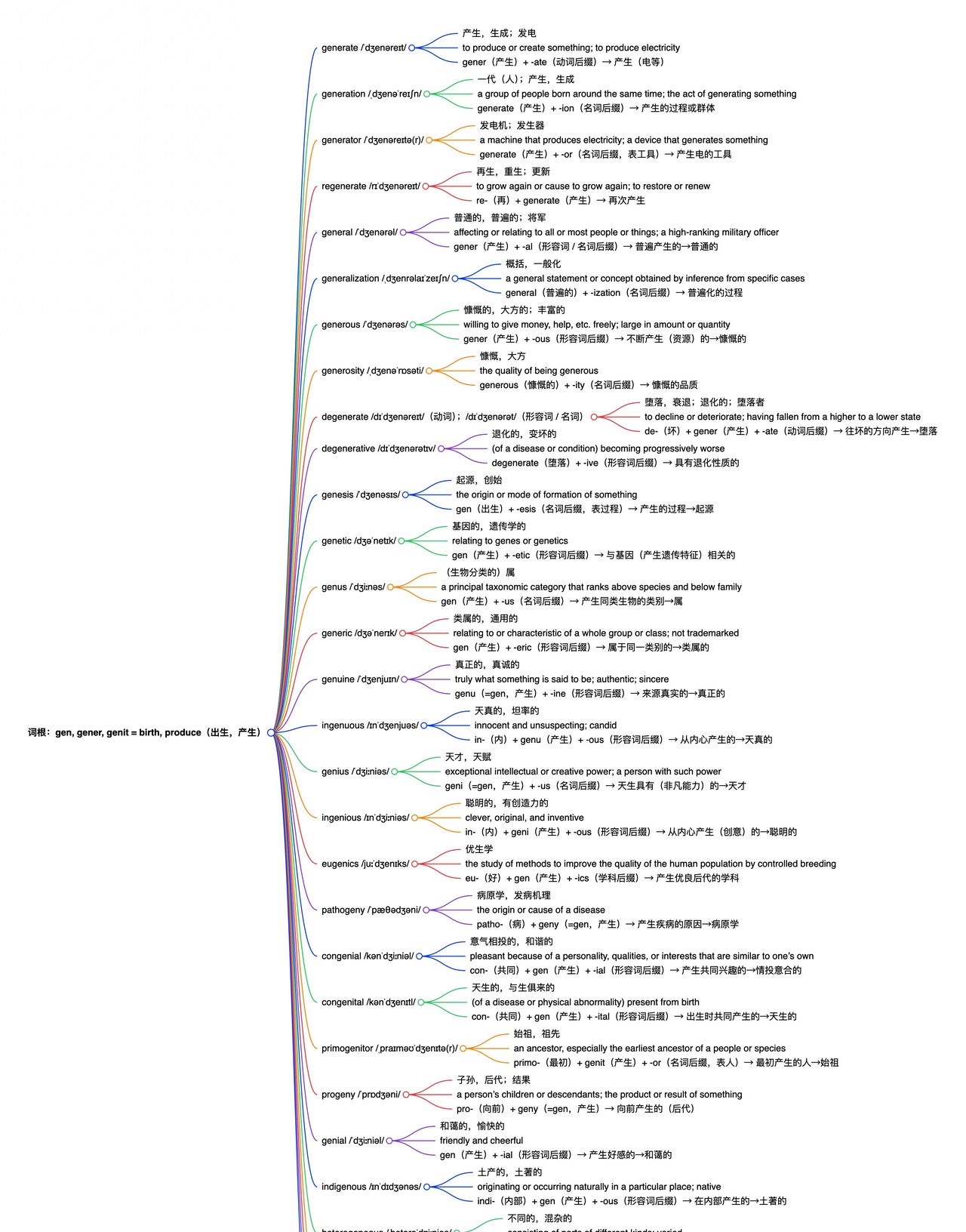gen,gener,genit=birth,produce,表明“出生,产生”

- generate /ˈdʒenəreɪt/
中文释义:产生,生成;发电。
英文释义:to produce or create something; to produce electricity.
构词:gener(产生)+ -ate(动词后缀)→ 产生(电等)。
例句:The wind turbine can generate enough electricity for 500 homes.(这台风力发电机能为 500 户家庭供电。) - generation /ˌdʒenəˈreɪʃn/
中文释义:一代(人);产生,生成。
英文释义:a group of people born around the same time; the act of generating something.
构词:generate(产生)+ -ion(名词后缀)→ 产生的过程或群体。
例句:My grandparents belong to a different generation.(我的祖父母属于不同的一代。) - generator /ˈdʒenəreɪtə(r)/
中文释义:发电机;发生器。
英文释义:a machine that produces electricity; a device that generates something.
构词:generate(产生)+ -or(名词后缀,表工具)→ 产生电的工具。
例句:The hospital has a backup generator in case of power cuts.(医院有备用发电机以防停电。) - regenerate /rɪˈdʒenəreɪt/
中文释义:再生,重生;更新。
英文释义:to grow again or cause to grow again; to restore or renew.
构词:re-(再)+ generate(产生)→ 再次产生。
例句:Some lizards can regenerate their tails if they lose them.(有些蜥蜴失去尾巴后能再生。) - general /ˈdʒenərəl/
中文释义:普通的,普遍的;将军。
英文释义:affecting or relating to all or most people or things; a high-ranking military officer.
构词:gener(产生)+ -al(形容词 / 名词后缀)→ 普遍产生的→普通的。
例句:There’s a general feeling that the team will win.(大家普遍认为这支队伍会赢。) - generalization /ˌdʒenrəlaɪˈzeɪʃn/
中文释义:概括,一般化。
英文释义:a general statement or concept obtained by inference from specific cases.
构词:general(普遍的)+ -ization(名词后缀)→ 普遍化的过程。
例句:Making broad generalizations about a group of people is unfair.(对一群人做笼统概括是不公平的。) - generous /ˈdʒenərəs/
中文释义:慷慨的,大方的;丰富的。
英文释义:willing to give money, help, etc. freely; large in amount or quantity.
构词:gener(产生)+ -ous(形容词后缀)→ 不断产生(资源)的→慷慨的。
例句:She’s always generous with her time when helping others.(她协助别人时总是不吝惜时间。) - generosity /ˌdʒenəˈrɒsəti/
中文释义:慷慨,大方。
英文释义:the quality of being generous.
构词:generous(慷慨的)+ -ity(名词后缀)→ 慷慨的品质。
例句:His generosity towards strangers is well-known.(他对陌生人的慷慨是出了名的。) - degenerate /dɪˈdʒenəreɪt/(动词);/dɪˈdʒenərət/(形容词 / 名词)
中文释义:堕落,衰退;退化的;堕落者。
英文释义:to decline or deteriorate; having fallen from a higher to a lower state.
构词:de-(坏)+ gener(产生)+ -ate(动词后缀)→ 往坏的方向产生→堕落。
例句:The discussion degenerated into a shouting match.(讨论演变成了一场争吵。) - degenerative /dɪˈdʒenərətɪv/
中文释义:退化的,变坏的。
英文释义:(of a disease or condition) becoming progressively worse.
构词:degenerate(堕落)+ -ive(形容词后缀)→ 具有退化性质的。
例句:Arthritis is a degenerative disease that affects the joints.(关节炎是一种影响关节的退行性疾病。) - genesis /ˈdʒenəsɪs/
中文释义:起源,创始。
英文释义:the origin or mode of formation of something.
构词:gen(出生)+ -esis(名词后缀,表过程)→ 产生的过程→起源。
例句:Scientists are studying the genesis of the universe.(科学家们在研究宇宙的起源。) - genetic /dʒəˈnetɪk/
中文释义:基因的,遗传学的。
英文释义:relating to genes or genetics.
构词:gen(产生)+ -etic(形容词后缀)→ 与基因(产生遗传特征)相关的。
例句:Genetic factors play a role in many diseases.(遗传因素在许多疾病中起作用。) - genus /ˈdʒiːnəs/
中文释义:(生物分类的)属。
英文释义:a principal taxonomic category that ranks above species and below family.
构词:gen(产生)+ -us(名词后缀)→ 产生同类生物的类别→属。
例句:Dogs and wolves belong to the same genus.(狗和狼属于同一属。) - generic /dʒəˈnerɪk/
中文释义:类属的,通用的。
英文释义:relating to or characteristic of a whole group or class; not trademarked.
构词:gen(产生)+ -eric(形容词后缀)→ 属于同一类别的→类属的。
例句:You can buy the generic version of this medicine for less money.(你可以买这种药的通用版本,更便宜。) - genuine /ˈdʒenjuɪn/
中文释义:真正的,真诚的。
英文释义:truly what something is said to be; authentic; sincere.
构词:genu(=gen,产生)+ -ine(形容词后缀)→ 来源真实的→真正的。
例句:Her genuine smile made everyone feel welcome.(她真诚的微笑让每个人都感到受欢迎。) - ingenuous /ɪnˈdʒenjuəs/
中文释义:天真的,坦率的。
英文释义:innocent and unsuspecting; candid.
构词:in-(内)+ genu(产生)+ -ous(形容词后缀)→ 从内心产生的→天真的。
例句:His ingenuous remarks revealed how little he knew about the situation.(他天真的话暴露了他对局势的了解甚少。) - genius /ˈdʒiːniəs/
中文释义:天才,天赋。
英文释义:exceptional intellectual or creative power; a person with such power.
构词:geni(=gen,产生)+ -us(名词后缀)→ 天生具有(非凡能力)的→天才。
例句:Mozart was a musical genius.(莫扎特是音乐天才。) - ingenious /ɪnˈdʒiːniəs/
中文释义:机智的,有创造力的。
英文释义:clever, original, and inventive.
构词:in-(内)+ geni(产生)+ -ous(形容词后缀)→ 从内心产生(创意)的→机智的。
例句:She came up with an ingenious solution to the problem.(她想出了一个巧妙的解决办法。) - eugenics /juːˈdʒenɪks/
中文释义:优生学。
英文释义:the study of methods to improve the quality of the human population by controlled breeding.
构词:eu-(好)+ gen(产生)+ -ics(学科后缀)→ 产生优良后代的学科。
例句:Eugenics was once promoted as a way to improve society but is now widely criticized.(优生学曾被宣扬为改善社会的方法,但目前广受批评。) - pathogeny /ˈpæθədʒəni/
中文释义:病原学,发病机理。
英文释义:the origin or cause of a disease.
构词:patho-(病)+ geny(=gen,产生)→ 产生疾病的缘由→病原学。
例句:Research into the pathogeny of the virus could lead to better treatments.(对这种病毒发病机理的研究可能带来更好的治疗方法。) - congenial /kənˈdʒiːniəl/
中文释义:意气相投的,和谐的。
英文释义:pleasant because of a personality, qualities, or interests that are similar to one’s own.
构词:con-(共同)+ gen(产生)+ -ial(形容词后缀)→ 产生共同兴趣的→情投意合的。
例句:We had a congenial conversation about our favorite books.(我们就各自喜爱的书进行了愉快的交谈。) - congenital /kənˈdʒenɪtl/
中文释义:天生的,与生俱来的。
英文释义:(of a disease or physical abnormality) present from birth.
构词:con-(共同)+ gen(产生)+ -ital(形容词后缀)→ 出生时共同产生的→天生的。
例句:The condition is congenital and affects vision from birth.(这种病是先天性的,从出生就影响视力。) - primogenitor /ˌpraɪməʊˈdʒenɪtə(r)/
中文释义:始祖,祖先。
英文释义:an ancestor, especially the earliest ancestor of a people or species.
构词:primo-(最初)+ genit(产生)+ -or(名词后缀,表人)→ 最初产生的人→始祖。
例句:Myths often describe a primogenitor who created the world.(神话中常描述一位创造世界的始祖。) - progeny /ˈprɒdʒəni/
中文释义:子孙,后代;结果。
英文释义:a person’s children or descendants; the product or result of something.
构词:pro-(向前)+ geny(=gen,产生)→ 向前产生的(后代)。
例句:The scientist’s work has influenced generations of his progeny.(这位科学家的成果影响了他的数代后人。) - genial /ˈdʒiːniəl/
中文释义:和蔼的,愉快的。
英文释义:friendly and cheerful.
构词:gen(产生)+ -ial(形容词后缀)→ 产生好感的→和蔼的。
例句:Our genial host made sure everyone felt at home.(我们和蔼的主人确保每个人都有宾至如归的感觉。) - indigenous /ɪnˈdɪdʒənəs/
中文释义:土产的,土著的。
英文释义:originating or occurring naturally in a particular place; native.
构词:indi-(内部)+ gen(产生)+ -ous(形容词后缀)→ 在内部产生的→土著的。
例句:Kangaroos are indigenous to Australia.(袋鼠是澳大利亚的土著动物。) - heterogeneous /ˌhetərəˈdʒiːniəs/
中文释义:不同的,混杂的。
英文释义:consisting of parts of different kinds; varied.
构词:hetero-(异)+ gen(产生)+ -eous(形容词后缀)→ 产生不同的→混杂的。
例句:The city has a heterogeneous population from many countries.(这座城市的人口来自多个国家,十分混杂。) - homogeneous /ˌhɒməˈdʒiːniəs/
中文释义:同种的,均匀的。
英文释义:of the same kind; uniform in composition.
构词:homo-(同)+ gen(产生)+ -eous(形容词后缀)→ 产生一样的→同种的。
例句:The solution is homogeneous, with no visible particles.(这种溶液是均匀的,没有可见颗粒。) - genre /ˈʒɒnrə/
中文释义:类型,流派(尤指文学、艺术)。
英文释义:a category of artistic composition, as in music or literature, characterized by similarities in form, style, or subject matter.
构词:gen(产生)+ -re(名词后缀)→ 产生同类作品的类别→流派。
例句:Science fiction is a popular literary genre.(科幻是一种受欢迎的文学流派。) - genteel /dʒenˈtiːl/
中文释义:高雅的,有礼貌的。
英文释义:polite, refined, and respectable, often in a way that is excessive.
构词:gent(=gener,产生,出身)+ -eel(形容词后缀)→ 出身良好的→高雅的。
例句:She comes from a genteel family with old-fashioned values.(她来自一个有着传统价值观的文雅家庭。) - engender /ɪnˈdʒendə(r)/
中文释义:产生,引起。
英文释义:to give rise to; bring about.
构词:en-(使)+ gender(=gener,产生)→ 使产生。
例句:The new policy engendered a lot of debate.(新政策引起了诸多争论。)
备注说明:
- 词根核心关联:
词根 “gen, gener, genit” 均与 “出生、产生” 的含义相关,可联想 “generate(产生)”、“gene(基因,决定生物产生的物质)” 作为核心词,辐射记忆其他单词(如 “genetic” 与基因相关,“genius” 指天生的才能)。 - 词缀方向辅助:
前缀 “de-” 表否定 / 变坏(如 degenerate “堕落”);
“eu-” 表 “好”(如 eugenics “优生学”);
“hetero-” 表 “异”,“homo-” 表 “同”(如 heterogeneous “混杂的” vs. homogeneous “同种的”)。 - 易混淆词辨析:
“ingenious”(机智的) vs. “ingenuous”(天真的):前者强调创造力,后者强调单纯坦率,可通过 “genius”(天才)联想 “ingenious” 与 “机智” 相关。
“genuine”(真正的) vs. “generic”(通用的):前者指真实性,后者指类别共性(如通用药品)。 - 发音与拼写:
“genre” 发音为 /ˈʒɒnrə/,注意 “g” 发 /ʒ/ 音,而非 /dʒ/;
“degenerate” 作动词时重音在第二音节,作形容词 / 名词时重音在第三音节。 - 语境应用:|
部分单词(如 “progeny”、“primogenitor”)偏书面或学术,日常使用较少;
“genial”“generous” 等则为高频词,需重点掌握。
通过 “产生、出生” 的核心含义,结合词缀逻辑和对比记忆,可高效掌握这组词根的相关词汇。
© 版权声明
文章版权归作者所有,未经允许请勿转载。
相关文章

暂无评论...













